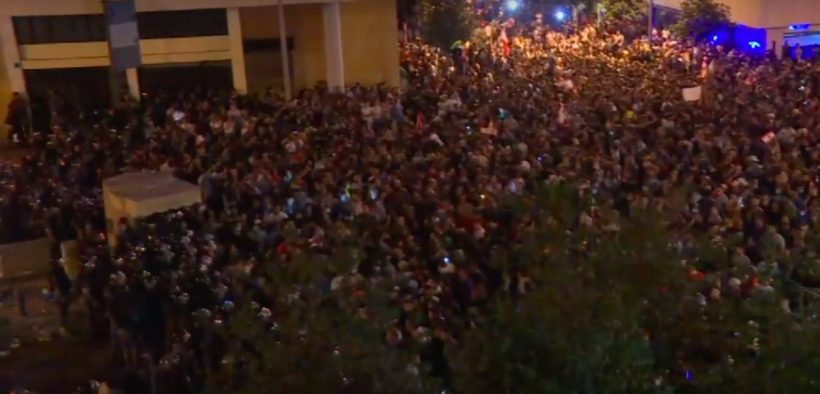Biggest Protest in Years as Lebanese Demand ‘Fall of the Regime’

“The people want the downfall of the regime” chant Lebanese protesters in a second consecutive day of popular unrest.
Tens of thousands of Lebanese residents continued protests for the second day in a row, on Friday, demanding economic reforms and a change of government. The demonstrations are being reported as the largest in years as thousands gathered outside the government headquarters in central Beirut on Thursday evening.
The current wave of protests forced Lebanese Prime Minister Saad Hariri to cancel a meeting of his cabinet, set for Friday, over 2020’s draft budget. The unprecedented popular uprising was sparked by Hariri’s plan to raise taxes on Whats App calls but protesters are also angry over accusations of government corruption.
The Whats App tax is believed to be the straw that broke the camel’s back, as Lebanon has endured through economic hardships for many years now.
The Protests
According to Al Jazeera, the protests have been marked by clashes between Lebanese riot police and protestors and have contained some reports of vandalism. On Friday morning, police reportedly confronted angry crowds with tear gas while reports of tires being lit on fire in the evenings and broken storefronts and billboards also circulated.
The National News Agency reported that two foreign workers died from smoke inhalation after a building close to the protests in Beirut caught on fire.
The protests began Thursday as civilians gathered to call for a new Lebanese government. According to Al Jazeera, several thousands of protesters gathered in Beirut and chanted, “the people want the downfall of the regime.”
While protesters in the town of Jeita, 12 miles from Beirut, chanted, “We are one people united against the state. We want it to fall.”
Only Lebanese flags .. Listen to them #Lebanon pic.twitter.com/8LfGPMiwq2
— Larissa Aoun (@LarissaAounSky) October 18, 2019
Lebanon Issues 72-Hour Ultimatum
In response to the mounting popular pressure, the Lebanese government promised its citizens it would find a solution to the protesters’ outrage within 72 hours. It also ordered schools across Lebanon to close doors on Friday.
Addressing the crowds at Beirut’s Martyr Square, Harriri said, “Either our government coalition’s partners give a clear answer or I will have something else to say. I have set a very short deadline.”
In reaction, the angry crowds demanded the resignation of Lebanon’s political leaders including Hariri, President Michel Aoun, Parliament Speaker Nabih Berri and Foreign Minister Gebran Bassil.
Root Cause of Lebanese Protests
On Thursday, the Lebanese Minister for Telecommunications Mohammad Choucair announced that the government planned to raise a new fee of 20 cents a day for calls via voice over internet protocol (VOIP), used by applications including Facebook-owned WhatsApp.
Later on, as protests spread, Chouciar said that the proposed plan to raise the tax had been revoked but protests have continued on unabated.
Lebanon was devastated by war from 1975 through 1990 and has struggled to recover. The country is considered to have one of the world’s highest debt burdens, and economic growth in the country has been crippled by both regional conflict and instability. Lebanon’s unemployment rate among youth under the age of 35 is estimated at 37 percent.
Adding to Lebanon’s difficulties has been an influx of hundreds of thousands of Syrian refugees from the Syrian war that erupted in 2011.
As the Guardian wrote, international donors have demanded that Lebanon implement economic changes in order to get loans and grants pledged at an economic conference in Paris in April 2018. International donors pledged $11 billion for Lebanon but they sought to ensure the money was well spent in the corruption-plagued country.








Lebanon is anything but “one people”. It’s a place where “multiculturalism” = civil war. Sunni, Shi’a, Druze, Christian, Palestinian refugees forced out of their homeland by the Zionist ethnic-cleansers — a lot of oil and water in that mix.
What’s the answer? Like most of humanity’s big problems, there is no “sustainable solution”, but there is an ultimate consequence: deaths, deaths, and more deaths.